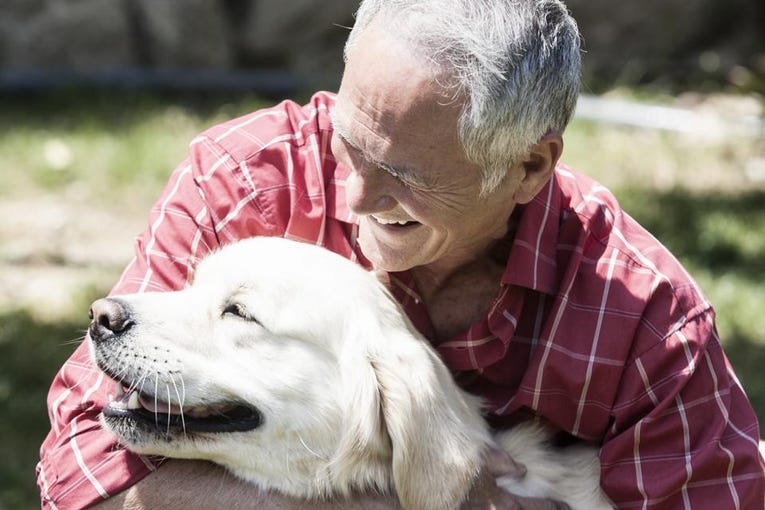
Service Dogs are dogs trained to perform specific tasks for the benefit of individuals with different types of disabilities - physical or mental. Service dogs are working animals and they can assist people at different ages to regain their confidence, improve their social skills and live a fulfilling life. The tasks that service animals can be trained to perform may vary as they can be emotionally or physically-related and adjusted to their handler’s particular needs.
Elderly people may have to deal with many challenges on a daily basis, since there are many medical conditions that affect individuals at an elderly age. Assistance animals providing comfort (although not recognized as service animals) and service animals can provide great help to elderly people.
Emotional Support Animals (ESA), although not considered service animals, can make elderly people feel loved and safe. ESAs can reduce the feeling of loneliness and depression in elderly persons just by being around them. When an elderly person has to deal with emotional issues, and feel mentally unstable, these animals can be very beneficial. ESAs have been recommended when people, especially at an older age, are dealing with cognitive issues.
Therapy Dogs are another type of assistance animals, that are not trained to perform specific tasks, but need to go through training to behave properly in different types of facilities and to fit the needs of the particular facility. When “working” in senior care centers, therapy dogs can help elderly people to improve their mobility skills through actions like: petting, grooming the dog, going outside for regular walks with the dog. Therapy dogs can be trained to retrieve certain objects to elderly patients so that they can avoid putting pressure on their bones and joints. Therapy dogs could also help people in senior medical centers to socialize easily or to participate in different social programs. Better socialization will mitigate the feeling of anxiety and/or depression.
If an elderly person decides to get an ESA or a Therapy Dog, respectively a family member decides to provide their elderly relative with such an animal, they need to know that these animals do not have the same public access rights that service dogs have and may be denied public access. If an elderly person needs assistance while in public. i.e. when go shopping, paying bills, using public transportation...etc. these types of animals may be denied access and handlers may not be able to bring them everywhere they go.
The most beneficial type of assistance animals are service animals as they are trained to perform specific tasks directly related to the person’s disability. Of course, to be eligible to have such an animal, persons need to be diagnosed with a disability by a medical professional. As we already explained in our previous article: “The ADA defines a person with a disability as a person who has a physical or mental impairment that substantially limits one or more major life activity. This includes people who have a record of such an impairment, even if they do not currently have a disability”.
Service dogs can be trained to perform physically-related as well as mentally-related tasks. Service Animals are a subject of the ADA regulations and their public access rights must be granted. Of course, their presence may be prohibited if they behave aggressively, cause damage or are disruptive towards people and other animals.
We will let you know more about the ways service dogs can help elderly people in particular and what tasks they can perform for their benefit.
Tasks Due to Physical Disorders
The assistance that service dogs provide to elderly people dealing with visual or mobility impairments, may be crucial for their safety and wellbeing.
Service dogs can be great guide/mobility dogs. They can be trained to pull a wheelchair, to serve as balance dogs, or to guide people with visual impairments in the right direction while in public. Moreover, service dogs can keep other people at a distance from their handlers and help them navigate in crowded places. While in public, service dogs can both provide mobility/guide support to their elderly handlers and comfort them emotionally if they feel anxious or distressed. We will take a look at mental-related support later.
The mobility benefits that the assistance of a service animal bring, can be related to the improvement of the circulation, the cardiovascular system, strengthening bones and muscles, increasing the blood pressure.
When at home service dogs can be trained to retrieve medication or to remind their owners about the medication they need to take in a prescribed time. Waking up their owner, i.e. after they got strong medication is another task that service dogs can be trained to perform. They can even be trained to bring the phone or press a button connected to 911 if needed.
Other useful tasks in a home environment that service dogs can fulfill is to turn on/off the lights or to bring their handlers different objects (not only medication) on command. In cases when elderly people deal with arthritis, even simple actions like picking up objects and bending over may cause serious back pain.
Barking as a signal response to alarms like: fire alarms, cocking alarms, clock alarms, may be life-saving in some situations, especially when their handlers are elderly persons with hearing problems. Hearing dogs are a really important type of service dogs, as they help their owners while in home as well as while in public. They assist their handlers to be aware of when they have received a text message or a phone call when they have forgotten a meal in the oven, when the smoke alarm has been activated, when the doorbell is ringing...etc.
Serious conditions affecting many elderly people around the world are Dementia and Alzheimer.
“Dementia is a general term for a decline in mental ability severe enough to interfere with daily life. Alzheimer’s is the most common cause of Dementia”. Alzheimer’s is a specific disease- it is considered a type of dementia that affects thinking, memory and behavior. Symptoms may grow severe enough to interfere with tasks on a daily basis. Although Dementia affects mental health it is not considered a mental illness. Rather, it is a disorder of the brain that can lead to communication difficulties and memory loss. Hence we can not put Dementia and mental health conditions like PTSD, anxiety, panic attacks over a common denominator.
Dementia and Alzheimer can lead to memory loss, difficulties in fulfilling simple daily tasks, inability to follow a conversation, struggling to concentrate, confusion about the place and/or time.
Service Dogs can be trained to assist people suffering from Dementia with routine actions like eating and dressing. These animals can prevent these people from wandering out of their home, especially when alone. If a person with a serious mental condition runs out of the house and gets lost, service dogs can guide them to their home or get a passerby’s attention through barking. Furthermore, a GPS can be attached to the service dog’s vest/harness/collar and will help the family members locate their relative.
In general, we can say that service dogs can help people with mental disorders follow their routines and move throughout the day.
Tasks Due to Mental Disorders
If elderly people i.e. veterans suffer from panic attacks, PTSD, stress, and anxiety Psychiatric Service Dogs can provide great help and alleviate the symptoms of the mental disorders.
Through Deep Pressure Therapy and Tactile Stimulation like: jumping on their handler’s lap, placing the chin on their lap, pawing, and nudging. Psychiatric Service Dogs are able to calm down their owners and “ground” them. The grounding is a term used to describe the help that a service dog provides to his/her owner when they have a dissociative episode with actions like face-licking, pawing or jumping in their lap. This means that the dog brings the handler back to reality.
Service Animals can help children, adults, and seniors to regain their confidence and be able to overcome daily challenges.












